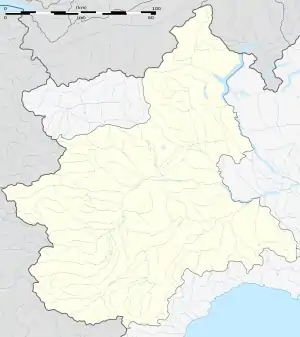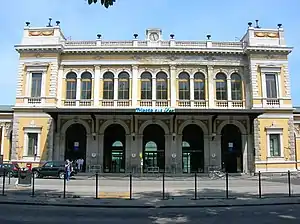Novara railway station
Novara railway station (Italian: Stazione di Novara) is the main station serving the city and comune of Novara, in the Piedmont region, northwestern Italy. Opened in 1854, it forms part of the Turin–Milan and is origin of the lines to Arona, to Alessandria, to Biella, Varallo, Domodossola and Luino, respectively.
 Main entrance to the passenger building. | |
| Location | Piazza Garibaldi 28100 Novara NO Novara, Novara, Piedmont Italy |
| Coordinates | 45°27′03″N 08°37′31″E |
| Operated by | Rete Ferroviaria Italiana Centostazioni |
| Line(s) | Turin–Milan Arona–Novara Novara–Alessandria Biella–Novara Varallo–Novara Novara–Gozzano–Domodossola |
| Distance | 98.940 km (61.478 mi) from Turin Porta Nuova[1] 65.528 km (40.717 mi) from Alessandria |
| Platforms | 13 |
| Train operators | Trenitalia, Trenord, SNCF |
| Connections |
|
| Other information | |
| Classification | Gold |
| History | |
| Opened | 3 July 1854 |
| Location | |
 Location in Piedmont  Location in Northern Italy  Location in Italy | |
The station is currently managed by Rete Ferroviaria Italiana (RFI). However, the commercial area of the passenger building is managed by Centostazioni. Each of these companies is a subsidiary of Ferrovie dello Stato (FS), Italy's state-owned rail company.
The rain services are operated by Trenitalia, SNCF and Trenord.
A second station, the Novara Nord railway station, is located a short distance away, and serves as the terminus of the Saronno–Novara railway, which is owned by Trenord.
Location
Novara railway station is situated at Piazza Garibaldi, at the northeastern edge of the city centre.
History
The station was opened on 3 July 1854, upon the opening of the Novara–-Mortara portion of the Arona–Alessandria railway.[2]
Features
The passenger station is equipped with fifteen tracks and passing loops, of which thirteen (10 platform and three loops, and 2 north and 1 south) are numbered for passenger service. Track 1 and the tracks of the first three platforms (2-3, 4-4A-5, and 6-6A-6B-7) are served directly from the subway and have a roof, though not for its entire length. The last three tracks are accessible from the platform of the tracks 6 and 7 with a track level crossing. Tracks 3 and 4 serve the Turin–Milan railway, while other tracks are mostly used by trains on the other, terminating, lines.
The goods yard is distinctly separated from the passenger station and is linked to the incoming lines by two lines connected in a triangle, starting from one end of the passenger station. This allows the goods yard to receive goods trains without having to occupy sections of line reserved for passenger services. At the end of the goods yard is the Centro Intermodale Merci (CIM), built at the turn of the twenty-first century, while along the track north of the triangle is the new Novara Nord railway station. Finally, the goods yard is linked with the Treno Alta Velocità (TAV) by a couple of tracks that are bypassed by the FNM line to Novara Nord.
Passenger and train movements
The station has about 9.4 million passenger movements each year, making it the seventh busiest Centostazioni station in terms of passenger movements.[3] There are about 350 trains per day, including any Trenitalia train replacement buses.
Trains stopping at Novara include TGV, Frecciabianca, Intercity Notte and regional trains, along with line S6 on the Milan suburban rail service. The most important domestic destinations of these trains are Turin, Milan and Venice, but passengers also depart for and arrive from other domestic destinations, such as Genoa, Biella and Vercelli. The main international links are with Paris.
Many of the station's passenger movements are arrivals from neighboring cities, with a large presence of students in the morning. However, the predominant component is commuter traffic to Milan, and, to a lesser extent, Turin. This traffic leads to overflowing commuter trains, even though each of them is made up of twelve carriages. Combined with the many and repeated delays, the uncomfortable travelling conditions have led to numerous protest actions, with resonance at the national level.
Goods traffic, which is also significant, is characterized by the presence of the CIM and a related rolling highway to northern Europe. Even the passage of goods trains in transit is not negligible.
Train services
The station is served by the following services:
- High speed services (TGV) Paris - Chambéry - Turin - Milan
- High speed services (Frecciabianca) Turin - Milan - Brescia - Verona - Vicenza - Padua - Venice - Trieste
- Night train (Intercity Notte) Turin - Milan - Parma - Rome - Naples - Salerno
- Night train (Intercity Notte) Turin - Milan - Parma - Reggio Emilia - Florence - Rome - Salerno - Lamezia Terme - Reggio di Calabria
- Historic train (Treno storico) Milan - Novara - Varallo Sesia
- Express services (Regionale Veloce) Turin - Chivasso – Vercelli – Novara – Milan
- Regional services (Treno regionale) Chivasso - Vercelli - Novara
- Regional services (Treno regionale) Biella San Paolo - Novara
- Regional services (Treno regionale) Domodossola - Premosello-Chiovenda - Omegna - Borgomanero - Novara
- Regional services (Treno regionale) Arona - Oleggio - Novara
- Regional services (Treno regionale) Novara - Mortara - Valenza - Alessandria
- Milan Metropolitan services (S6) Novara - Milan - Treviglio
| Preceding station | SNCF | Following station | ||
|---|---|---|---|---|
toward Paris-Lyon | TGV | Terminus |
||
| Preceding station | Trenitalia | Following station | ||
toward Torino Porta Nuova | Frecciabianca | toward Trieste Centrale |
||
toward Torino Porta Nuova | Intercity Notte | toward Salerno |
||
toward Torino Porta Nuova | Intercity Notte | toward Reggio di Calabria Centrale |
||
toward Torino Porta Nuova | Treno regionale | toward Milano Centrale |
||
Borgo Vercelli toward Chivasso | Treno regionale | Terminus | ||
Nibbia toward Biella San Paolo | Treno regionale | Terminus | ||
Caltignaga toward Domodossola | Treno regionale | Terminus | ||
toward Arona | Treno regionale | Terminus | ||
| Terminus | Treno regionale | Garbagna toward Alessandria |
||
| Preceding station | Trenord | Following station | ||
| Terminus | Trenord R25 |
Garbagna toward Mortara | ||
| Preceding station | Milan suburban railway service | Following station | ||
| Terminus | Trenord S6 | toward Treviglio |
See also
References
- 51.979 km (32.298 mi) from Milan Central
- Alessandro Tuzza; et al. "Prospetto cronologico dei tratti di ferrovia aperti all'esercizio dal 1839 al 31 dicembre 1926" [Chronological overview of the features of the railways opened between 1839 and 31 December 1926]. Trenidicarta.it (in Italian). Alessandro Tuzza. Retrieved 26 November 2010. External link in
|work=(help) - "Flussi Annui nelle 103 Stazioni" [Annual flows at the 103 stations]. Centostazioni website (in Italian). Centostazioni. Archived from the original on 9 February 2010. Retrieved 13 December 2010.
External links
![]() Media related to Novara railway station at Wikimedia Commons
Media related to Novara railway station at Wikimedia Commons
